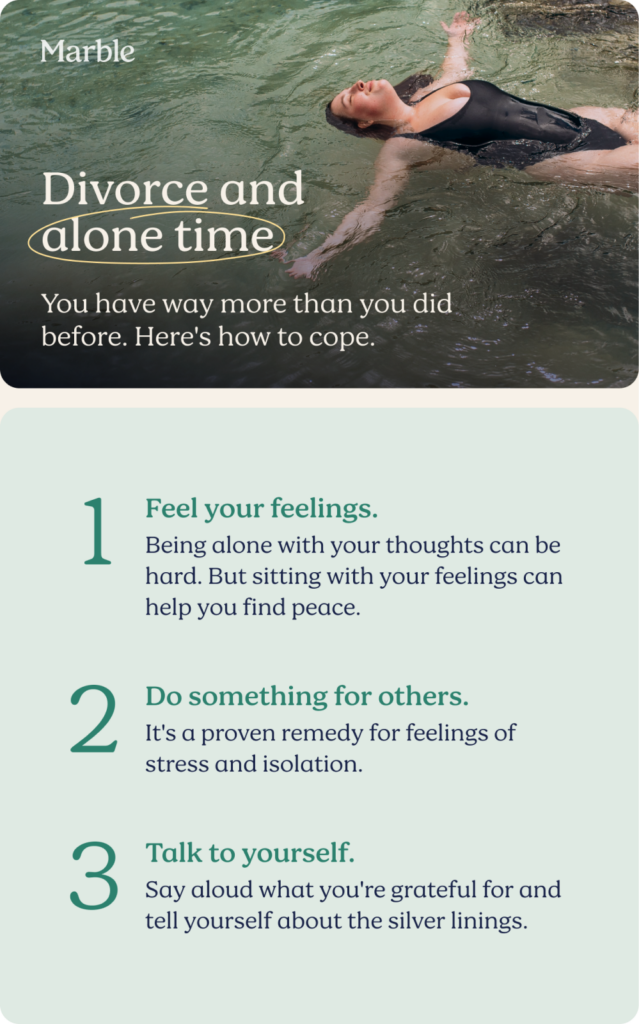
This page includes links to third party websites. The inclusion of third party websites is not an endorsement of their services.
No two divorces are the same, but there’s one constant that runs through all of them: change. Even if you know your divorce is for the best (and, if it’s any comfort, studies show that nearly 70% of people report no regret when it comes to their divorce), it represents a major life overhaul.
No matter how long you’ve been with your partner, the fact is: you likely won’t be spending much time with them anymore–and you may find yourself alone more often than you used to be as a result. And while alone time can be great, we understand it can take some getting used to. Here’s how to cope.
1) Feel your feelings
Many who find themselves alone during a divorce (or any difficult time) seek distraction to quiet racing thoughts and suppress uncomfortable feelings. And while we totally advocate for taking your mind off things (more on that down below), sometimes, feeling your feelings is the way to go.
We know this is easier said than done, but to start, employ some mindfulness techniques: first, try to identify your emotions.
For example, if you feel uncomfortable, say to yourself, “I feel uncomfortable.” Next, consider the emotion with curiosity, not judgment. And finally, allow yourself to feel some self-compassion–and remember that all of the feelings you’re feeling are valid.

2) Schedule a worry hour
It’s understandable if you’re stressed about all the ways your life is changing because of your divorce–but there are ways to manage it.
Take clinical psychologist Dr. Emily Anhalt’s advice and schedule a “worry hour” into your calendar. That’s a pre-set time where you allow yourself to stress about everything that’s going on in your life.
Once you’ve spent an entire hour ruminating on all of the things that may or may not come up, you’ll have freed up the rest of your day for focus and fun.
3) Focus on positive self-talk
Don’t be afraid of talking to yourself–but watch what you say. Too often, our inner voice tends towards negative self-talk.
Luckily, there’s a fix for this: shifting your focus towards gratitude. Grateful people are scientifically proven to have more satisfaction with life.
To start, look in the mirror and tell yourself one thing you’re grateful for, right now. Tomorrow, increase that to two. And within a month, when you’re running through a much longer list, we promise you’ll feel a little bit better.
4) Do something for others
One of the best ways to stop stressing about your own life circumstances is to take care of someone else. Not only is helping those who need it important, but perspective is powerful.
If you can, we recommend looking up local volunteer opportunities in your community or researching a cause you’re passionate about and getting involved from afar.
And if that’s not possible, you can get similar benefits from smaller tasks–like spending a few minutes to call and check in on a friend.
5) Allow yourself to shut off when you need to
Some days, you may feel too exhausted to spend your time focusing on mindfulness, gratitude, and self-compassion. And guess what? That’s completely fine.
There are certain nights that call for kicking back with some reality TV or unwinding with a good movie and a podcast. If that’s what you feel like you need today, go for it. If you don’t know where to start, check out our guide on what to watch, read, and listen to during your divorce.
We hope you use these tips to help make a tough time feel a little bit easier. And remember, even though things may feel difficult right now–you’re doing great.
